The SANDBOX Act | A Trojan Horse for AI Tyranny + The Rise of Technocratic Governance

Technocracy.news
Courtenay Turner | courtenayturner.substack.com
A New Era of AI Regulatory Minimalism
On September 10, 2025, Senator Ted Cruz introduced the Strengthening Artificial intelligence Normalization and Diffusion By Oversight and eXperimentation (SANDBOX) Act, a comprehensive piece of legislation that fundamentally reimagines how America approaches artificial intelligence regulation. This 41-page bill represents the most significant attempt yet to institutionalize a "light-touch" regulatory framework for AI development, positioning the United States to compete with China while potentially reshaping the balance of power between government oversight and corporate autonomy.
“Winning the AI race is about more than just technological advancement. If the United States fails to lead, the values that infuse AI development and deployment will not be American ones, but the values of regimes that use AI to control rather than to liberate. If China wins the AI race, the world risks an order built on surveillance and coercion." Sen.Ted Cruz
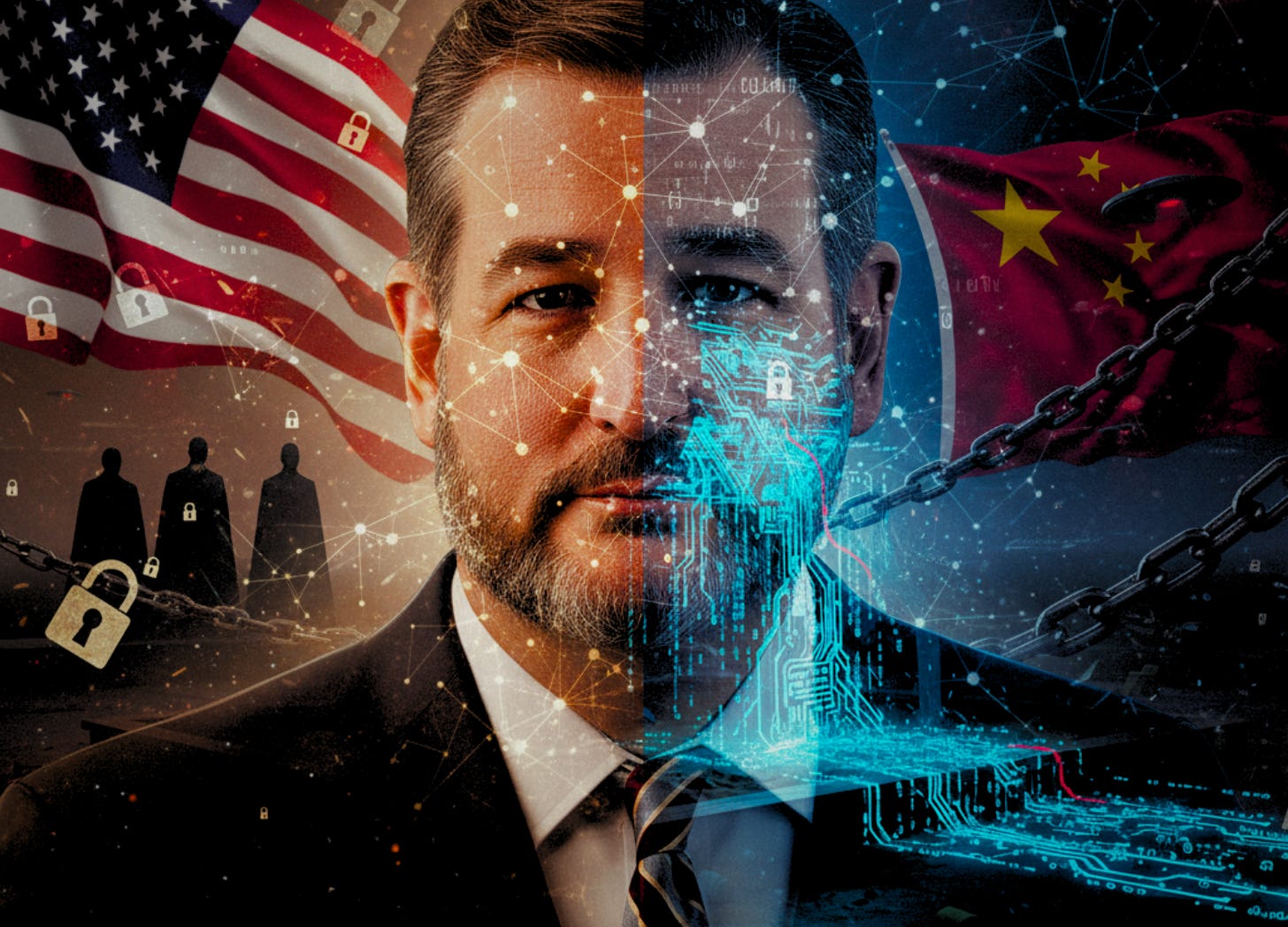
The SANDBOX Act operates as the cornerstone of Cruz's broader five-pillar AI framework, which ostensibly encompasses unleashing American innovation, protecting free speech, preventing burdensome state regulations, stopping nefarious AI uses, and defending human dignity. The AI framework and the SANDBOX Act mark the first congressional effort to implement the recommendations of AI Action Plan the Trump Administration released on July 23. However, the legislation's implications extend far beyond technical policy—it signals a profound shift toward technocratic governance, where technical expertise and corporate innovation drive policy decisions rather than traditional citizen deliberation and representative governance.
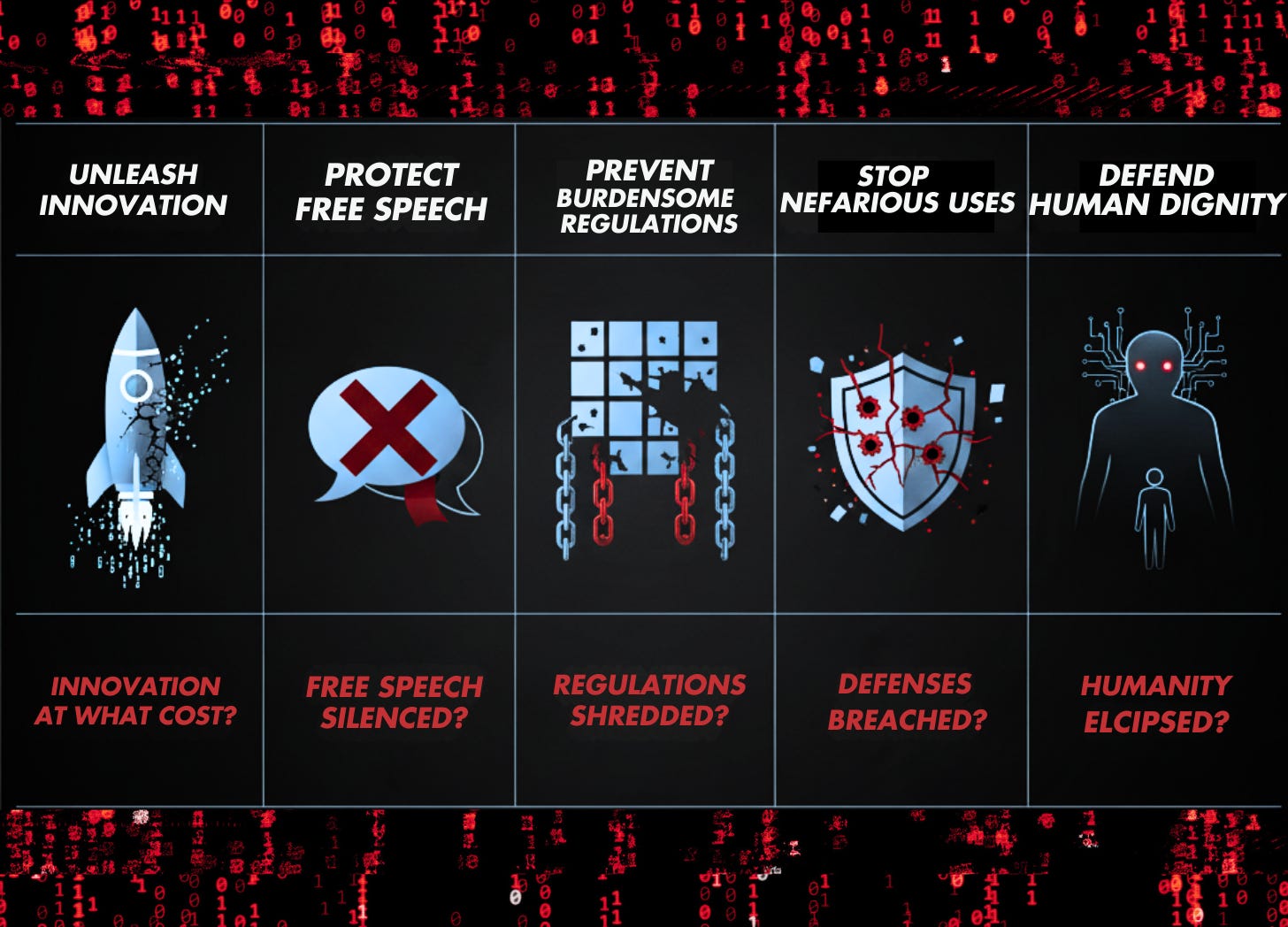
The Five Pillars: A Legislative Framework for American Leadership in Artificial intelligence
I. Unleash American Innovation and Long-Term Growth
• Establish Federal Al Regulatory Sandbox Program
• Streamline Al Infrastructure Permitting
• Open Up Federal Datasets for Al Model Training
Il. Protect Free Speech in the Age of Al
• Anti-Jawboning: Stop Government Censorship
• Reform the Al Priorities and Goals of the National Institute of Standards and Technology (NIST)
• Combat Foreign Censorship of Americans
Ill. Prevent a Patchwork of Burdensome Al Regulation
• Clarify Federal Standards to Prevent Burdensome State Al Regulations
• Counter Excessive Foreign Regulation of Americans
IV. Stop Nefarious Uses of Al Against Americans
• Protect Americans Against Digital Impersonation Scams and Fraud
• Expand Take It Down Act Principles to Safeguard American Schoolchildren
V. Defend Human Value and Dignity_
• Reinvigorate Bioethical Considerations in Federal Policy
• Oppose Al-Driven Eugenics and Other Threats to Human Dignity and Flourishing
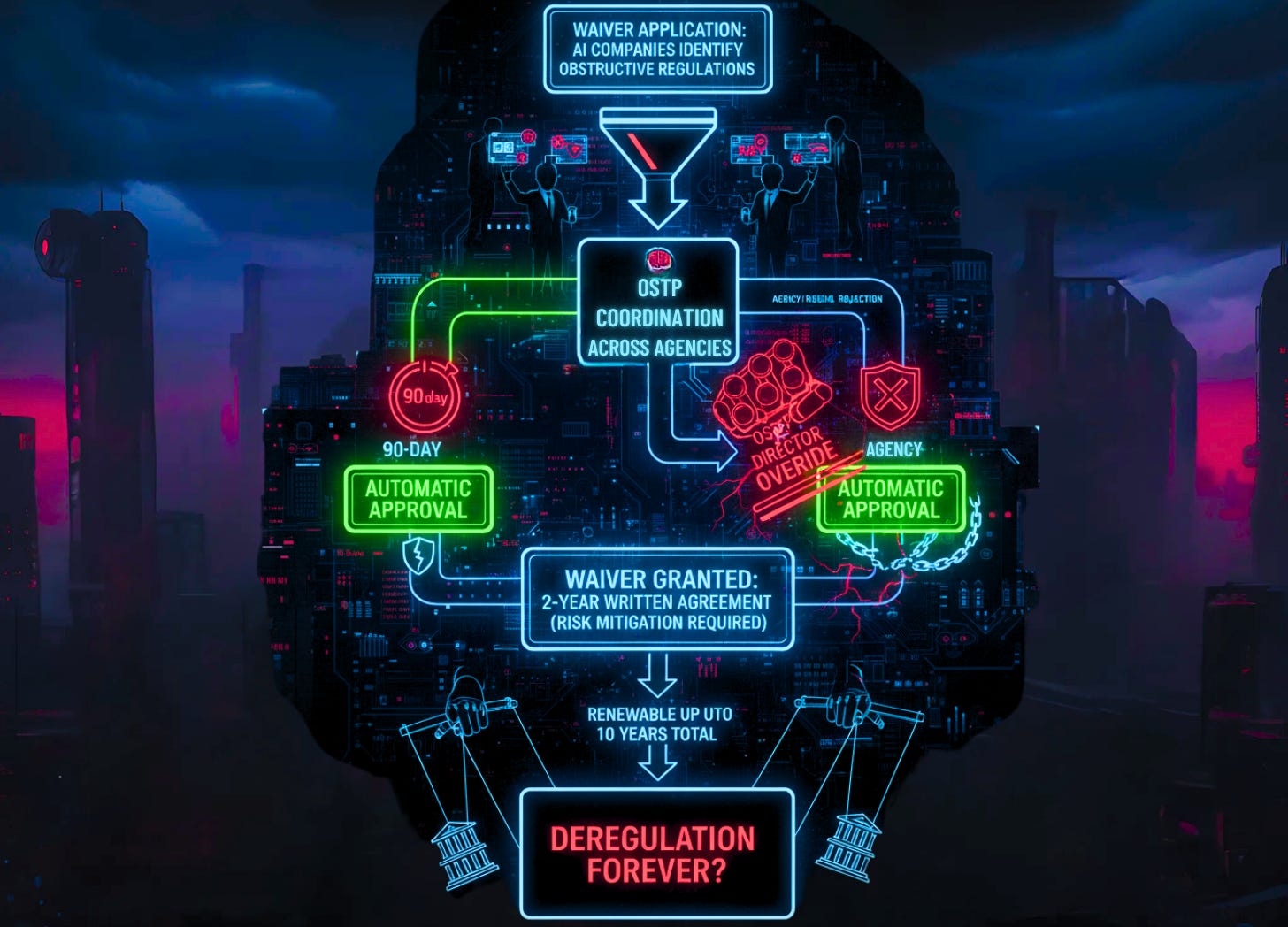
The Mechanics of Regulatory Sandbox Governance
The SANDBOX Act creates an unprecedented federal program administered by the White House Office of Science and Technology Policy (OSTP), allowing AI companies to apply for two-year regulatory waivers that can be renewed for up to ten years total. Under this framework, companies can request exemptions from virtually any federal regulation that might "impede their work," including licensing requirements, safety protocols, and consumer protection standards.
The process grants extraordinary power to the OSTP director, who can override agency rejections of waiver applications and effectively nullify regulatory decisions made by expert agencies like the Federal Trade Commission, Food and Drug Administration, or Federal Aviation Administration. If agencies fail to respond within 90 days, waivers are automatically approved—a mechanism that creates a presumption in favor of deregulation. The program sunsets in 12 years unless renewed, and OSTP has to report back to Congress on waivers, potentially recommending permanent regulation changes or repeals—measures that critics argue provide only illusory accountability while paving the way for long-term industry-favored deregulation. It’s endorsed by big players like the U.S. Chamber of Commerce and tech councils, and it builds on state-level sandboxes in places like Texas and Utah. Cruz frames it as a way to “unleash American ingenuity” and compete with China, tying into Trump-era AI plans.
Michael Kratsios, the current OSTP director who previously worked at Scale AI, (a Thiel backed company) has expressed enthusiastic support for the legislation, drawing parallels to successful drone regulatory sandboxes from the first Trump administration. His background exemplifies the revolving door between AI companies and government positions that characterizes the current regulatory environment.
"I have personally seen the power of these sandboxes to be able to allow great American minds and innovators to actually put their tools to the test in real-life situations, and from there, be able to provide the necessary valuable feedback back to the regulators to be able to create the right regulatory frameworks." Michael Kratsios

The Technocracy Imperative: Innovation Over Constitutional Process
The SANDBOX Act embodies core principles of technocratic governance—the belief that complex policy decisions should be delegated to technical experts and industry professionals rather than subjected to traditional public accountability. This approach assumes that rapid technological innovation serves the public interest more effectively than self governing processes, which are viewed as inherently slow and inefficient.
Cruz's framework explicitly prioritizes American competitiveness against China over civic discourse about AI's societal impacts. The senator argues that "if we don't innovate, we'll lose" and that government oversight would "almost ensure America loses the race to AI". This framing transforms AI policy into a geopolitical competition where institutional protections become obstacles to national security, while the third pillar of Trump’s AI Action Plan exports the stack to make the American “technate” a global authority.
The legislation's automatic approval mechanisms and OSTP override powers represent a significant departure from traditional regulatory processes that typically involve public comment periods, expert agency review, and judicial oversight. Instead, decisions about which regulations to waive would largely occur behind closed doors between government officials and industry representatives, with minimal public input or transparency.
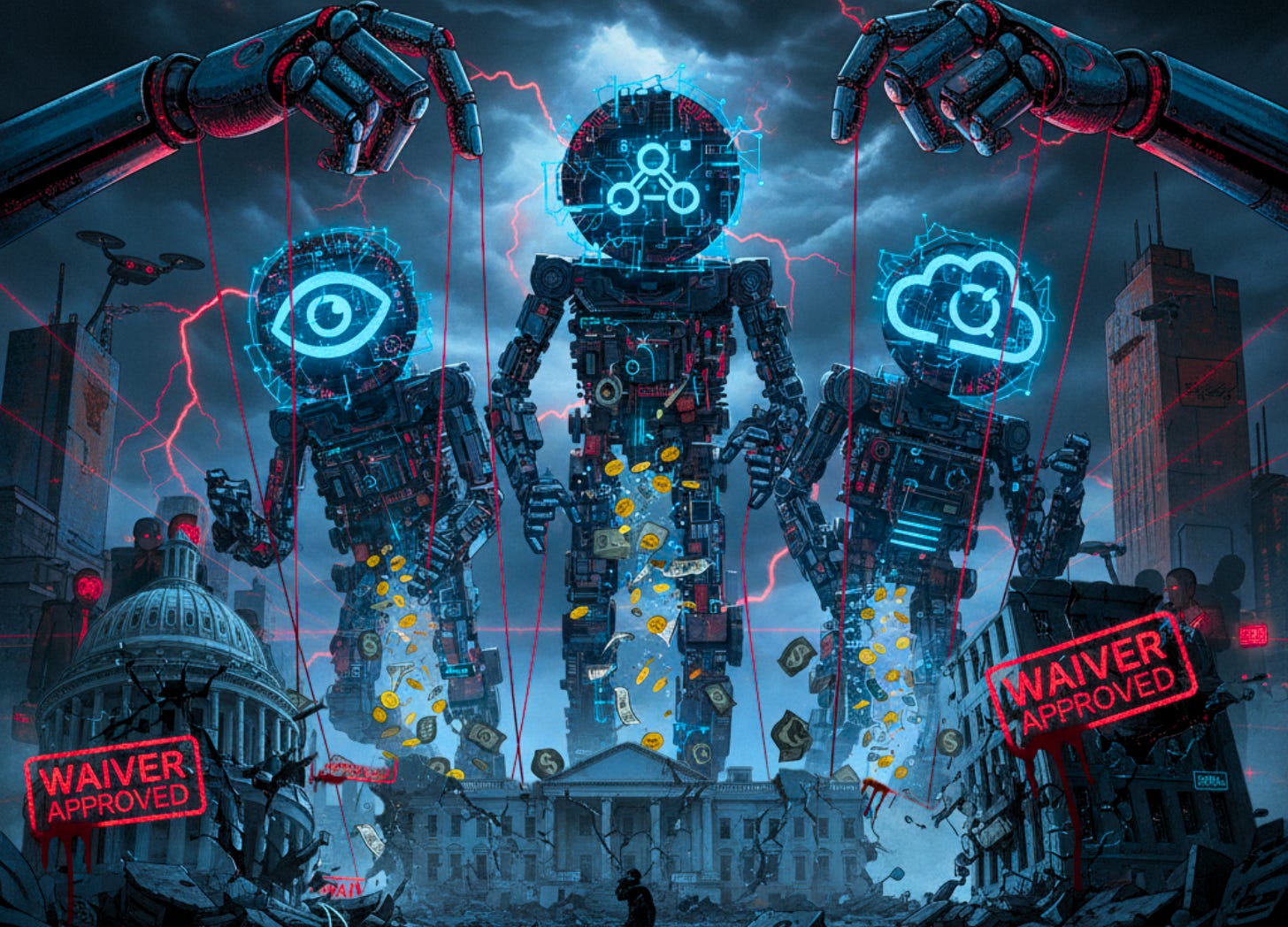
Regulatory Capture and Corporate Influence
The SANDBOX Act raises profound concerns about regulatory capture—the phenomenon where regulatory agencies advance industry interests rather than public welfare. The legislation's structure appears designed to facilitate what experts describe as different forms of industry influence, including agenda-setting, information management, and cultural capture through status.
Public Citizen has characterized the bill as creating "a sweetheart deal for Big Tech CEOs" that would allow Silicon Valley to adopt a "move fast and break things" mentality regarding laws and regulations. Public Citizen's Big Tech accountability advocate J.B. Branch elaborated, stating it 'guts basic consumer protections, lets companies skirt accountability, and treats Americans as test subjects,' while giving Big Tech a 'green light to override the laws and regulations they don't want to follow,' potentially threatening children's safety, consumers' privacy, and American constitutionalism. The Alliance for Secure AI warns that the legislation "removes much-needed oversight as Big Tech refuses to remain transparent with the public about the risks of advanced AI".
““It’s unconscionable to risk the American public’s safety to enrich AI companies that are already collectively worth trillions...The sob stories of AI companies being ‘held back’ by regulation are simply not true, and the record company valuations show it. Lawmakers should stand with the public, not corporate lobbyists, and slam the brakes on this reckless proposal. Congress should focus on legislation that delivers real accountability, transparency, and consumer protection in the age of AI.” J.B. Branch
Brendan Steinhauser, CEO of the Alliance for Secure AI, echoed this, emphasizing that 'the SANDBOX Act removes much-needed oversight' amid Big Tech's lack of transparency on advanced AI risks.
“Ideally, Big Tech companies and frontier labs would make safety a top priority and work to prevent harm to Americans. However, we have seen again and again that they have not done so. The SANDBOX Act removes much-needed oversight as Big Tech refuses to remain transparent with the public about the risks of advanced AI,” he said. “This raises many questions about who can enter the so-called ‘regulatory sandbox’ and why. We hope that we will get answers to these questions in the coming days.” Brendan Steinhauser
The automatic approval mechanism particularly concerns critics, as it effectively shifts the burden of proof from companies seeking deregulation to agencies trying to maintain oversight. This reverses traditional regulatory presumptions and creates strong incentives for agencies to approve waivers rather than risk OSTP override.
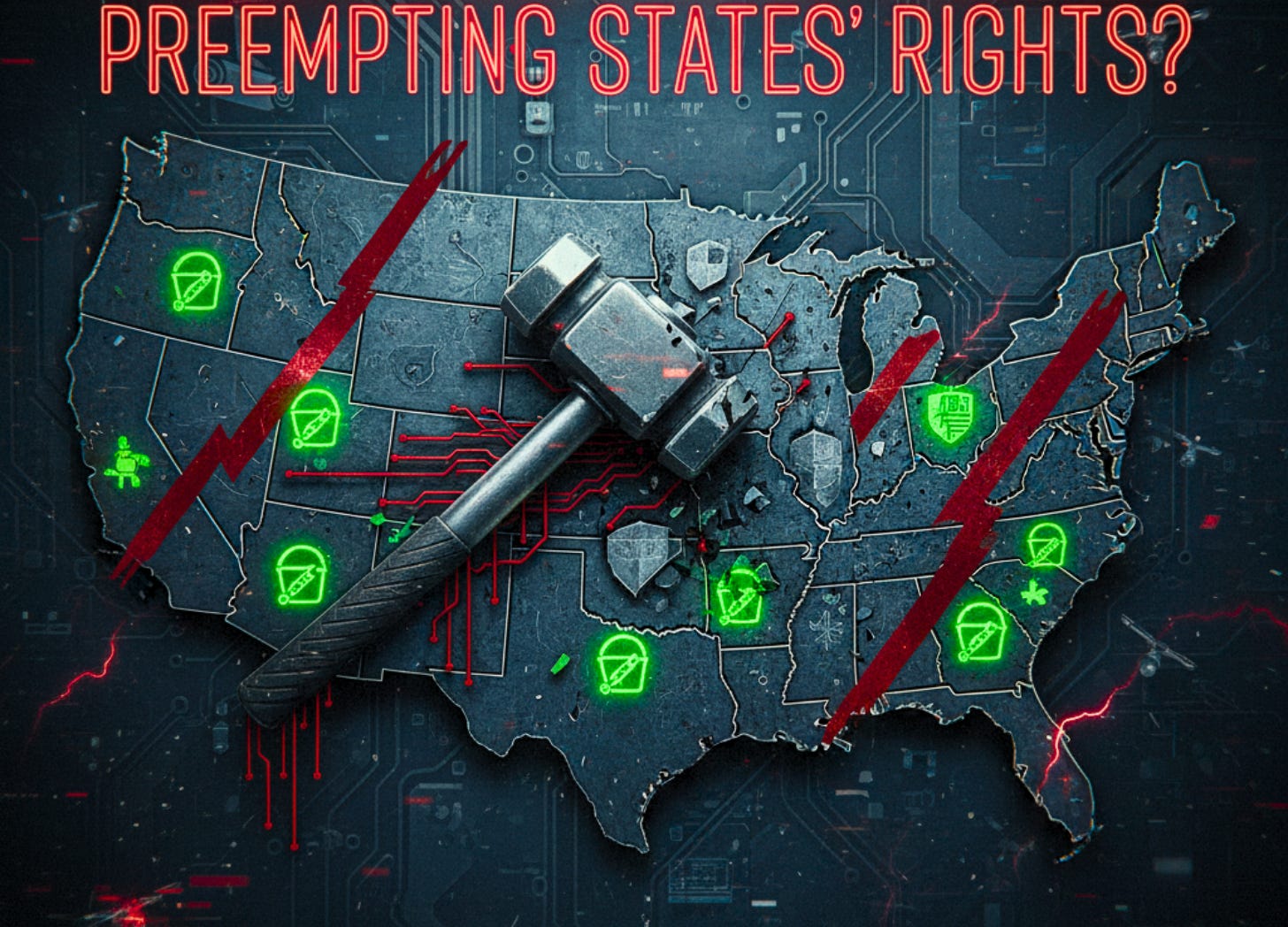
Federal Preemption and the Assault on State Authority
Beyond creating federal sandboxes, Cruz's broader framework explicitly seeks to preempt state AI regulations, characterizing them as creating a "patchwork of burdensome" rules that hinder innovation. The Trump administration's AI Action Plan already limits federal funding to states with "burdensome" AI regulations, effectively coercing state compliance with federal deregulatory preferences.
This preemption agenda represents a significant departure from traditional Republican federalism principles, with Cruz acknowledging that while he is "a fierce guardian of states' rights and federalism," AI regulation should be addressed at the federal level. The approach has generated bipartisan opposition, with Republican senators like Marsha Blackburn and Josh Hawley joining Democrats in defending state regulatory authority.
States have been at the forefront of AI regulation, addressing issues like deepfake political advertising, AI-generated intimate images, and healthcare AI disclosure requirements. Federal preemption would eliminate these protections while providing no guarantee of equivalent federal standards, potentially creating a regulatory vacuum that benefits only industry interests.
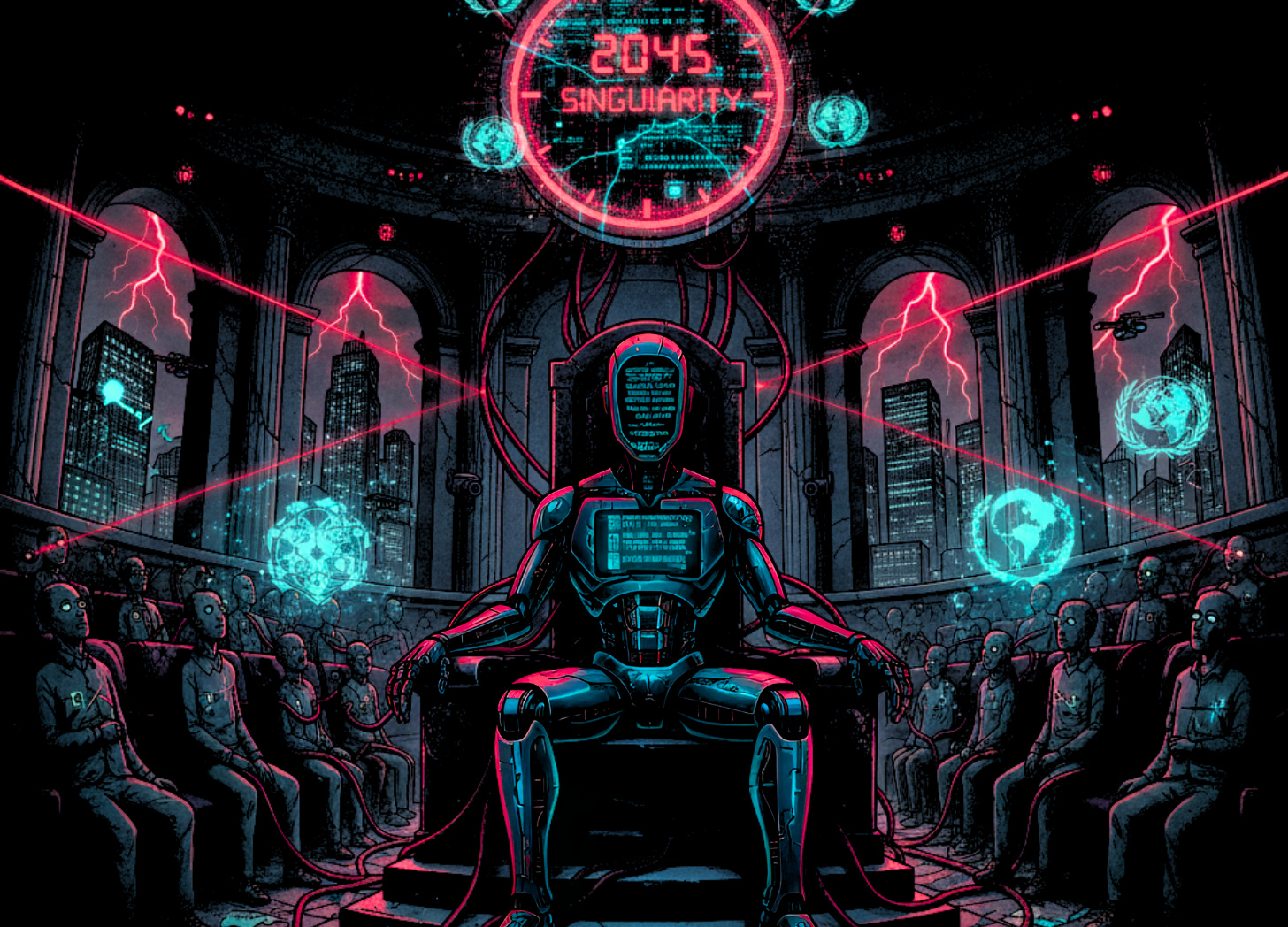
The Democratic Deficit in AI Governance
The SANDBOX Act exemplifies broader concerns about AI's impact on constitutional self governance, particularly regarding accountability, representation, and trust. By insulating AI development from traditional regulatory oversight, the legislation could accelerate what researchers describe as "algocracy"—government by algorithm where human accountability becomes obscured. Critics like Kate Brennan of the AI Now Institute argue that such sandboxes “put people at risk by launching technologies into the market without adequate protections,” failing to address threats like cybersecurity, privacy concerns, or algorithmic bias—issues that bipartisan congressional recommendations have called for stronger enforcement on. Who defines “harm”? And what happens when these “tests” go wrong in the real world, affecting millions? This bill normalizes AI’s diffusion into every corner of society, as seen in global experiments like Albania’s appointment of an AI minister for public tenders, which replaces human bureaucrats with unaccountable algorithms under the guise of efficiency. This echoes the United Nations’ Artificial Intelligence World Society (AIWS) vision for supplanting human government with AI by 2045, the same timeline Ray Kurzweil pushes for the technological singularity, where AI surpasses human intelligence and starts self-improving in recursive loops—cybernetic tyranny on steroids. Don’t overlook the esoteric undertones: the push for AI-driven “collective intelligence” smacks of Game B’s emergent coherence—euphemisms for algorithmic governance dressed as spiritual evolution.
The bill's emphasis on speed and efficiency over deliberative process reflects technocratic assumptions that complex AI systems can be effectively governed through technical expertise alone. However, AI systems increasingly shape fundamental aspects of democratic life, from information access to electoral processes, requiring broader societal input than industry-dominated sandboxes can provide.
Democratic theorists argue that AI governance presents foundational challenges to democratic principles, potentially concentrating power in the hands of technical elites and undermining the equality and accessibility that democratic processes require. The SANDBOX Act's structure could accelerate these trends by institutionalizing industry influence while marginalizing public participation.
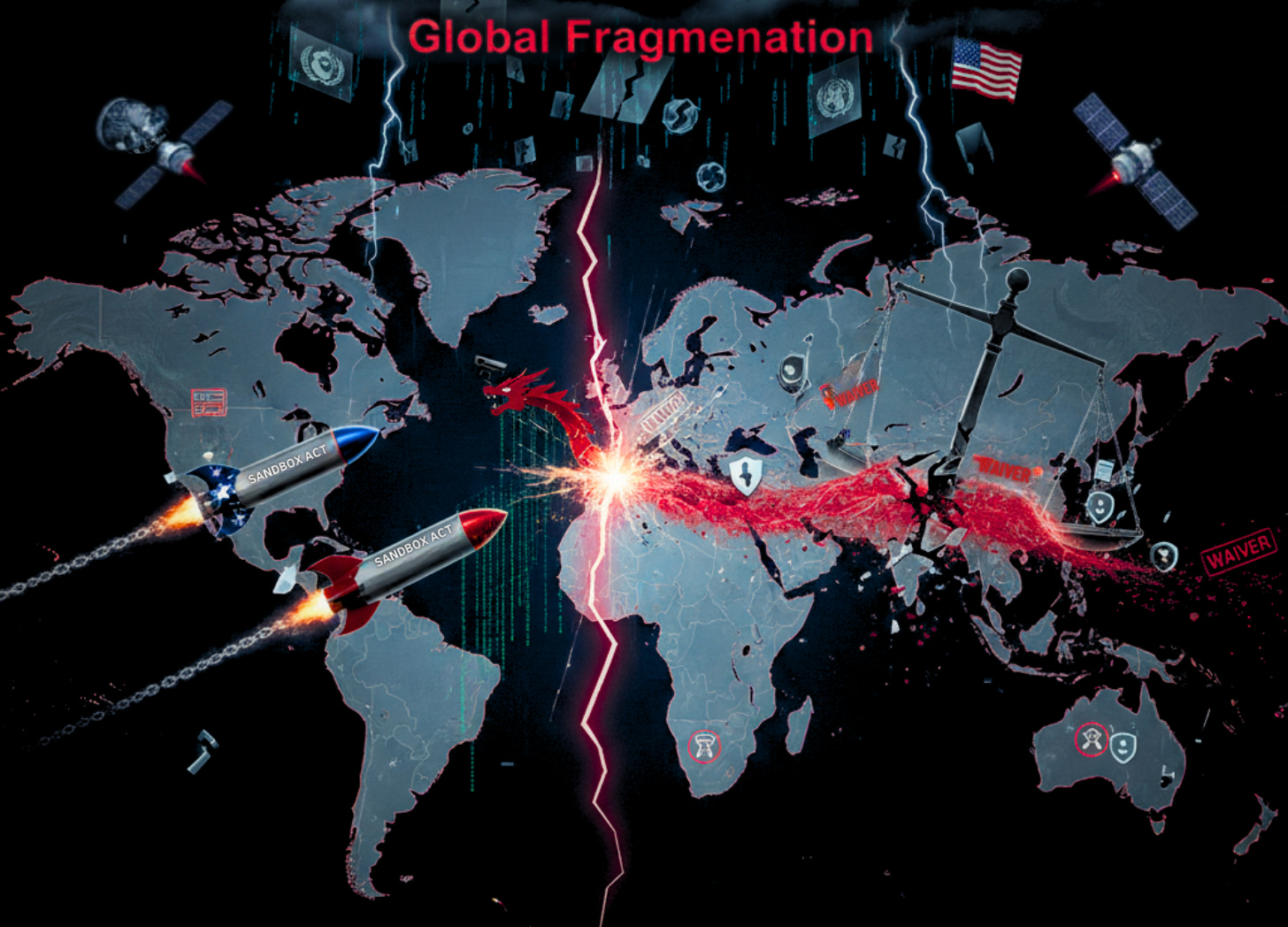
International Implications and the Global AI Race
Cruz positions the SANDBOX Act within a broader geopolitical competition with China, arguing that regulatory restraint is essential for maintaining American AI leadership. This framing has significant implications for global AI governance, potentially pressuring other nations to adopt similarly permissive approaches to avoid competitive disadvantage.
The legislation reflects the Trump administration's broader rejection of the European Union's comprehensive AI Act, which Kratsios describes as "not at all the way the U.S. is approaching this space". Instead, the administration favors "use-case and sector-specific" frameworks that rely heavily on industry self-regulation and voluntary compliance.
This divergence could fragment global AI governance, with different regions adopting incompatible regulatory approaches that complicate international coordination on AI safety and standards. The emphasis on national competitiveness over international cooperation could ultimately undermine collective efforts to address AI's global challenges. Think about the bigger picture: Cruz’s sandbox isn’t just about innovation; it’s accelerating a global technocratic shift, echoing initiatives like the UN’s AIWS for AI-supplanted governance by 2045—where this pathway is possible as a strategic outgrowth of the AI Action Plan: Sandboxes fuel innovation (Pillar I), which enables exports (Pillar III) in a fragmented world, casting the U.S. as the technocratic resolver of global AI dilemmas. This is the slippery slope to replacing bureaucrats (bloated as they are) with unaccountable AI systems, as Elon Musk and others have hinted. It’s the same old story: efficiency, safety, order, promised by every authoritarian regime from the Nazis’ “scientific administration” to the Soviets’ “rational planning.” Now it’s AI overseeing our lives, tracking every move under the guise of progress.

The Future of American AI Governance
The SANDBOX Act represents more than technical policy reform—it embodies a fundamental reimagining of the relationship between innovation, regulation, and democratic governance. By prioritizing speed and corporate autonomy over deliberative oversight, the legislation could establish precedents that extend far beyond AI to other emerging technologies.
The bill's fate in Congress will likely determine whether the United States embraces technocratic governance as its primary response to technological complexity or maintains traditional democratic institutions for addressing societal challenges. Early indications suggest significant industry support, with organizations like the U.S. Chamber of Commerce and Information Technology Council endorsing Cruz's approach.
However, consumer advocacy groups, civil liberties organizations, and state officials are mobilizing opposition, arguing that the legislation prioritizes corporate profits over public safety and accountability. Eric Null of the Center for Democracy and Technology called it “a step in the wrong direction,” noting that the U.S. AI sector is already thriving without such measures, with no evidence that current regulations stifle innovation. Additionally, the complex application process could favor well-resourced Big Tech firms, creating unfair advantages and regulatory loopholes that distort markets. The ultimate resolution of this debate could define American governance for decades to come.
The SANDBOX Act thus presents a critical inflection point: will the United States use emerging AI capabilities to strengthen participatory institutions and public welfare, or will it cede increasing authority to technical elites and corporate interests in pursuit of competitive advantage? The answer will shape not only American AI development but the future of democratic governance and the constitutional republic in an age of algorithmic power.
The stakes extend beyond technology policy to the fundamental question of who governs in a Constitutional Republic—elected representatives accountable to voters, expert agencies serving the public interest, or corporate technologists pursuing private gain under the banner of national competitiveness. The SANDBOX Act forces Americans to confront these choices explicitly, making it one of the most consequential pieces of technology legislation.
References:
AI Now Institute. (n.d.). https://ainowinstitute.org/
Akin Gump Strauss Hauer & Feld LLP. (2025, September 10). Chair Cruz Introduces “Sandbox” Bill/AI Framework. https://www.akingump.com/en/insights/ai-law-and-regulation-tracker/chair-cruz-introduces-sandbox-billai-framework
Alliance for Secure AI. (2025, September 10). SANDBOX Act is a Win for Big Tech – Not Americans. https://secureainow.org/press-release/sandbox-act-is-a-win-for-big-tech-not-americans/
Boston Global Forum. (n.d.). AIWS: Pioneering AI Governance and New Democracy. https://bostonglobalforum.org/publication/aiws-pioneering-ai-governance-and-new-democracy/
Center for Democracy & Technology. (n.d.). Eric Null. https://cdt.org/staff/eric-null/
Center for Strategic and International Studies. (2025, July 30). Unpacking the White House AI Action Plan with OSTP Director Michael Kratsios. https://www.csis.org/analysis/unpacking-white-house-ai-action-plan-ostp-director-michael-kratsios
Common Dreams. (2025, September 10). Advocates Warn Against Ted Cruz’s Industry-Friendly ‘Sandbox’ for AI. https://www.commondreams.org/news/ted-cruz-ai
FedScoop. (2025, September 10). Cruz to introduce proposal for regulatory AI sandbox program within OSTP. https://fedscoop.com/cruz-introduce-proposal-regulatory-ai-sandbox-program-within-ostp/
Global Policy Watch. (2025, September). Senator Cruz Unveils AI Framework and Regulatory Sandbox Bill. https://www.globalpolicywatch.com/2025/09/senator-cruz-unveils-ai-framework-and-regulatory-sandbox-bill-2/
Government Technology. (2025, September 11). Proposed SANDBOX Act May Remove AI Oversight for Developers. https://www.govtech.com/policy/proposed-sandbox-act-may-remove-ai-oversight-for-developers
Information Security Media Group. (2025). Ted Cruz Wants to Give AI Companies a Regulatory Time Out. https://www.bankinfosecurity.com/ted-cruz-wants-to-give-ai-companies-sandbox-that-safe-a-29468
POLITICO Pro. (2025, September 10). Cruz introduces ‘sandbox’ bill and new AI framework. https://subscriber.politicopro.com/article/2025/09/cruz-releases-ai-framework-and-sandbox-bill-00555478
Public Citizen. (2025, September 10). SANDBOX Act Puts Public Safety on the Chopping Block in Favor of Corporate Immunity. https://www.citizen.org/news/sandbox-act-puts-public-safety-on-the-chopping-block-in-favor-of-corporate-immunity/
Reuters. (2025, September 10). US Senator Cruz proposes AI ‘sandbox’ to ease regulations on tech companies. https://www.reuters.com/legal/litigation/us-senator-cruz-proposes-ai-sandbox-ease-regulations-tech-companies-2025-09-10/
Sidley Austin LLP. (2025, July 30). The Trump Administration’s 2025 AI Action Plan – Winning the Race. https://www.sidley.com/en/insights/newsupdates/2025/07/the-trump-administrations-2025-ai-action-plan
Tech Policy Press. (2025, September 10). US Senator Ted Cruz Proposes SANDBOX Act to Waive Federal Regulations for AI Developers. https://techpolicy.press/us-senator-ted-cruz-proposes-program-to-waive-federal-regulations-for-ai-developers
The White House. (2025, July). America’s AI Action Plan. https://www.whitehouse.gov/wp-content/uploads/2025/07/Americas-AI-Action-Plan.pdf
U.S. Senate Committee on Commerce, Science, and Transportation. (2025, September 10). Sen. Cruz Unveils AI Policy Framework to Strengthen American AI Leadership. https://www.commerce.senate.gov/2025/9/sen-cruz-unveils-ai-policy-framework-to-strengthen-american-ai-leadership
U.S. Senate Committee on Commerce, Science, and Transportation. (2025, September 10). WTAS: Industry Leaders, Policy Experts Back Chairman Cruz’s AI Policy Framework and SANDBOX Act. https://www.commerce.senate.gov/2025/9/wtas-industry-leaders-policy-experts-back-chairman-cruz-s-ai-policy-framework-and-sandbox-act
U.S. Senate Committee on Commerce, Science, and Transportation. (2025). Strengthening Artificial Intelligence Normalization and Diffusion By Oversight and eXperimentation (SANDBOX) Act. https://www.commerce.senate.gov/services/files/50958F76-A64C-418A-8FCA-650D9DE2602B
Wikipedia. (n.d.). Michael Kratsios. https://en.wikipedia.org/wiki/Michael_Kratsios
Source: https://courtenayturner.substack.com/p/the-sandbox-act?r=lphy5&triedRedirect=true&utm_medium=ios
Act Source: https://www.commerce.senate.gov/services/files/032DEA9D-0C56-41B4-A155-53FFC3987350
Source: https://www.commerce.senate.gov/services/files/50958F76-A64C-418A-8FCA-650D9DE2602B
Original Article: https://www.technocracy.news/the-sandbox-act-gives-teeth-to-the-ai-action-plan/
Related:
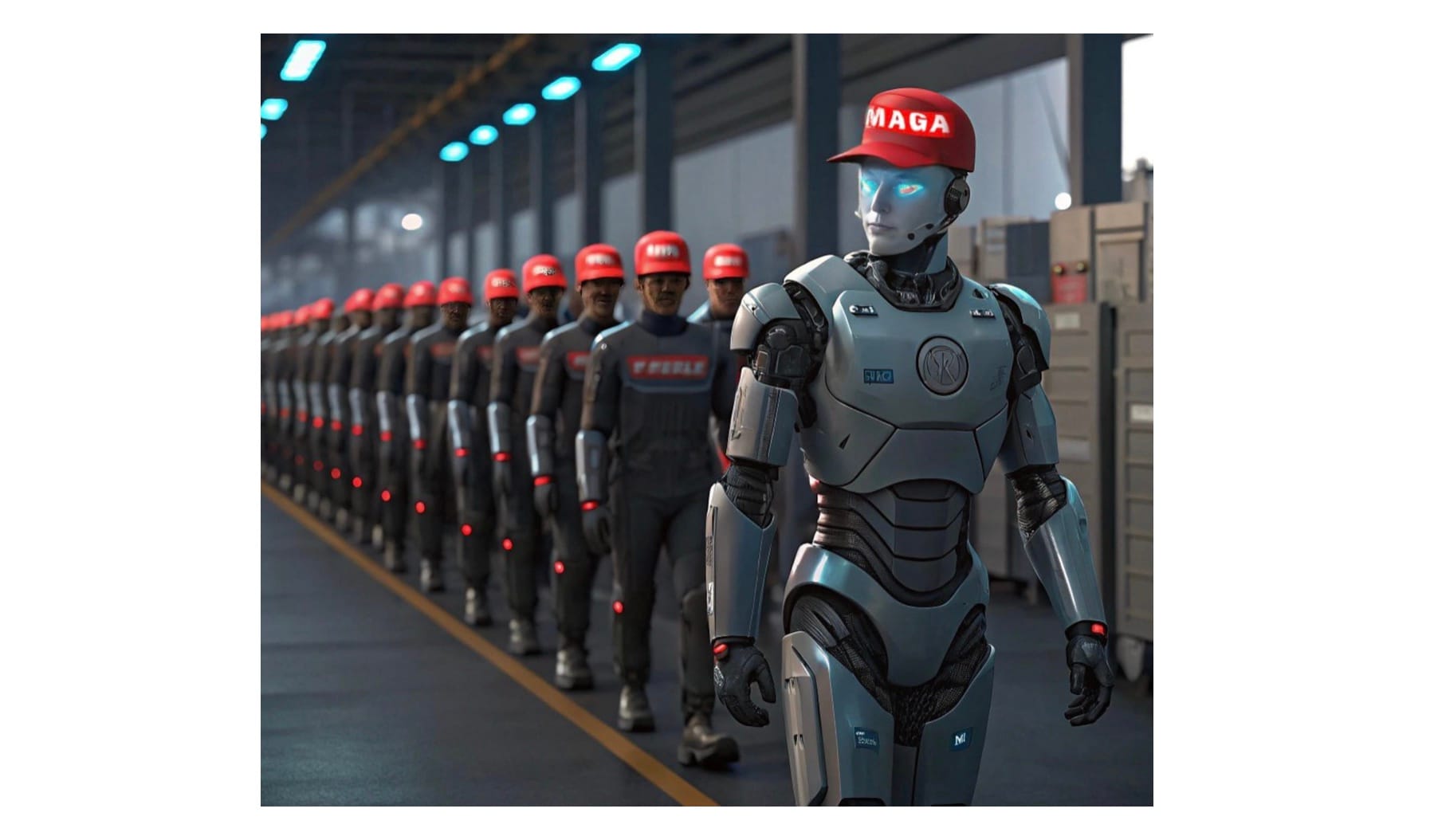












Comments ()